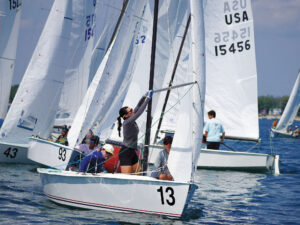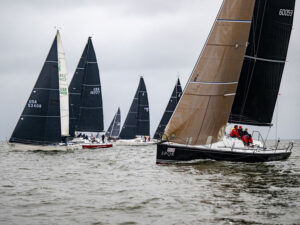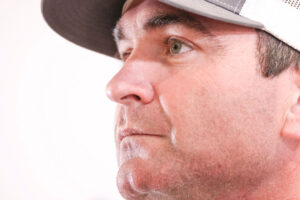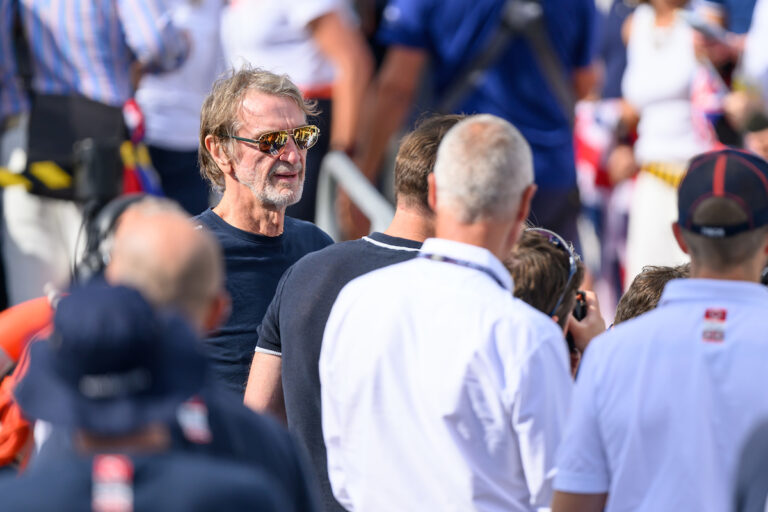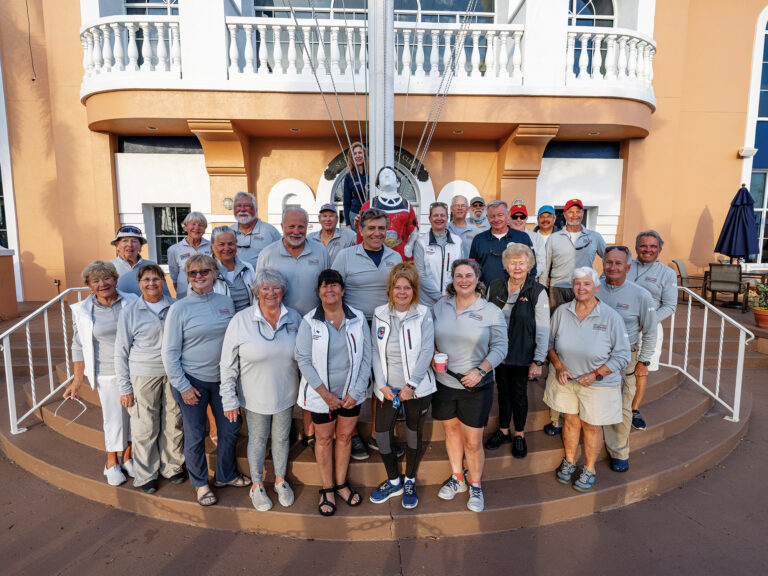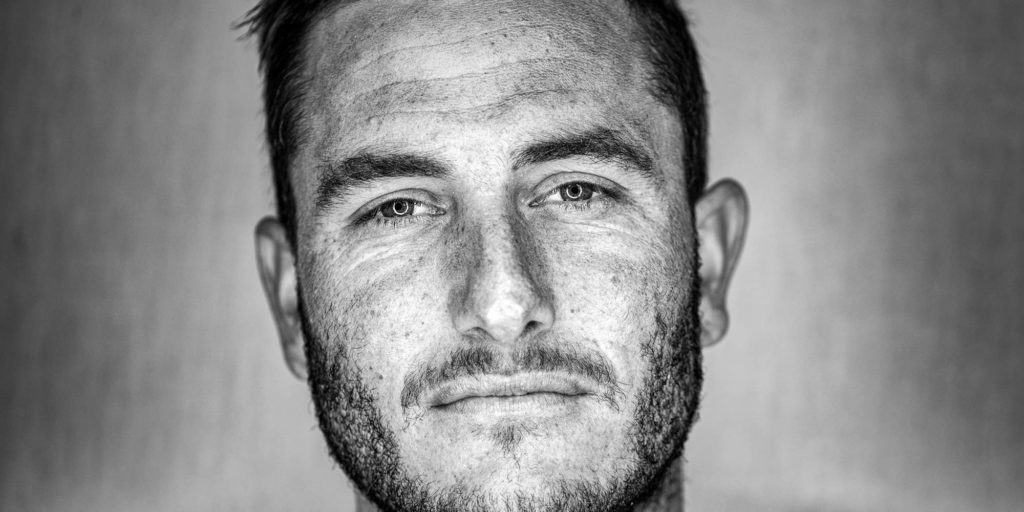
Striding through the Volvo Ocean Race Village that bloomed out of the concrete around Auckland’s Viaduct Harbour, Blair Tuke is on a mission. When he reaches the Mapfre base out on the Halsey Wharf, he enters a jam-packed shipping container, wedging himself between towers of freeze-dried food and racks of foul-weather gear that are waiting for the next dive into the Southern Ocean. He quickly whips off his team shirt and pulls on a black T-shirt that is distinctly Kiwi.
The illustration on the tee is a chalkboard with a tally of some of the country’s more popular fish — snapper, kahawai and kingies. Aside from sailing, fishing is Tuke’s other love.
Offshore veteran Neal McDonald, Mapfre’s performance manager, pokes his head into the container. “You’ve come in disguise today, have you?”
“Yeah,” replies Tuke. “It’s a bit quicker getting through the village this way.”
Perhaps incognito he might not have to stop every 20 footsteps or so to shake hands or engage in friendly banter.
Not that Tuke is tongue-tied or uncomfortable in a crowd. On the contrary. His Olympic coach, Hamish Willcox, calls him the most “socially astute” person he’s ever come across. “He has compassion with a capital C.” He’s easygoing, warm and open in his conversation.
But perhaps it’s because Tuke — at 28, already an America’s Cup winner, six‑time world champion, and Olympic gold and silver medalist — wants to blend in with the crowd. He relishes rare moments of normality.
He admits he no longer posts photos on Instagram of his family home in an idyllic and secluded bay within the Bay of Islands. “I try to keep it on the down-low a little bit,” he says. “It’s a pretty special spot.”
Not long after Mapfre crossed the Volvo Ocean Race’s sixth-leg finish line on the Waitemata Harbour (in third place), Tuke escaped with his three brothers — Nathan, Daniel and Jesse — to Apple Tree Bay, and the house in which they grew up. Soon, not far off the front lawn, the brothers were freediving and spearfishing, collecting a bounty of seafood: crayfish, paua (abalone), snapper, kingfish and John Dory.
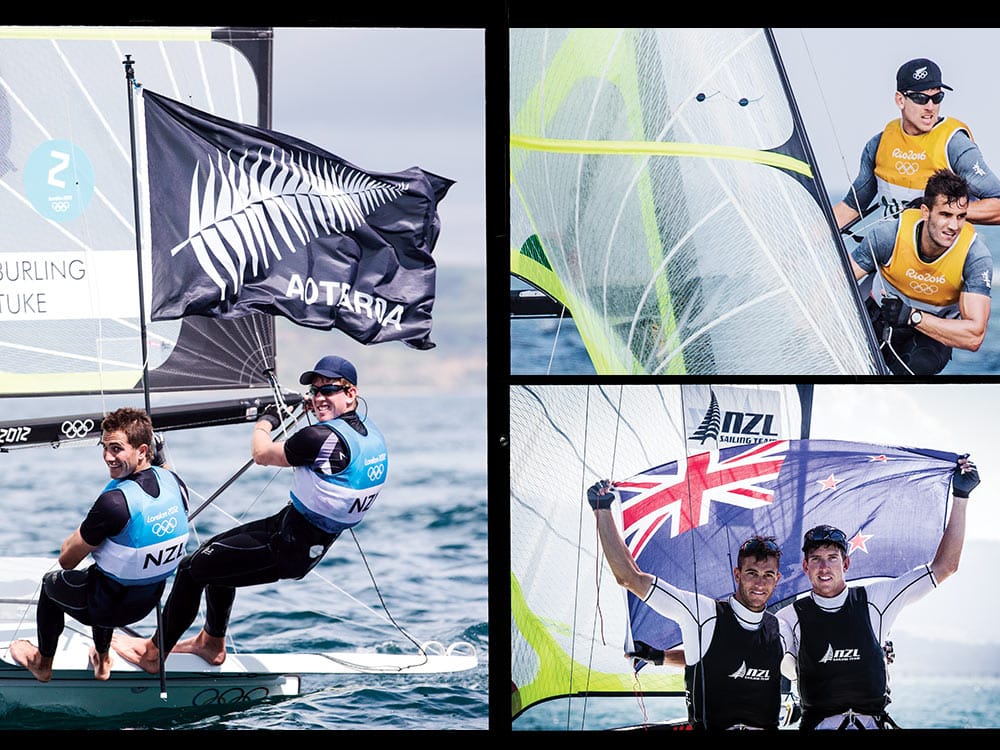
Blair, the third-born, speaks passionately about taking from, but also protecting, New Zealand’s marine life. “I love freediving especially. It’s a much more sustainable way to fish because you take what you want to eat and don’t hurt anything else. I’d like to do more to raise awareness, to try to spread the message of how much trouble our oceans are in.”
This is a side of Tuke that few people know. That and his passion for rugby. He tries, sometimes in vain, to keep a balanced life.
Although he would almost become the first sailor in history to claim the “triple crown” — Olympic gold, America’s Cup and a Volvo Ocean Race title — that elusive honor doesn’t consume him.
“It’s not really all-important to me. My main goal is to do this race, learn from it and fulfill my childhood dream.”
A dream that began with a shabby old dinghy, and a book on his oceangoing idols.
On the main stage on Te Wero Island in the Viaduct, two brothers tussle over a microphone. Their mother watches, unconcerned, from a bean bag out in front.
Jesse is the village compère during the Volvo Ocean Race stopover — responsible for a public grilling of his older brother in a Saturday-morning Q&A session.
“So, Blair, where to from here?” he asks. Both brothers laugh at the family inside joke. Even though his brothers declare they’re his biggest fans, they won’t let the heavily decorated Tuke rise above his station.
Blair tells the 100 or so people who’ve gathered that, first, there is Emirates Team New Zealand’s defense of the 2021 America’s Cup to formulate, and that he and Peter Burling are considering mounting a third Olympic campaign for Tokyo 2020.
He reveals they are also thinking about entering a New Zealand-flagged boat in a future VOR. “Pete and I would love to bring a team together, and hopefully in the next race,” he says.
“I don’t know how he does it all,” Jesse says. “He was a lot more driven than me when it came to sailing as kids. I knew I wasn’t cut out for it, because he would go sailing every day after school.” The brothers won a 29er national title together, but while one drifted away from the sport, the other sailed from strength to incredible strength.
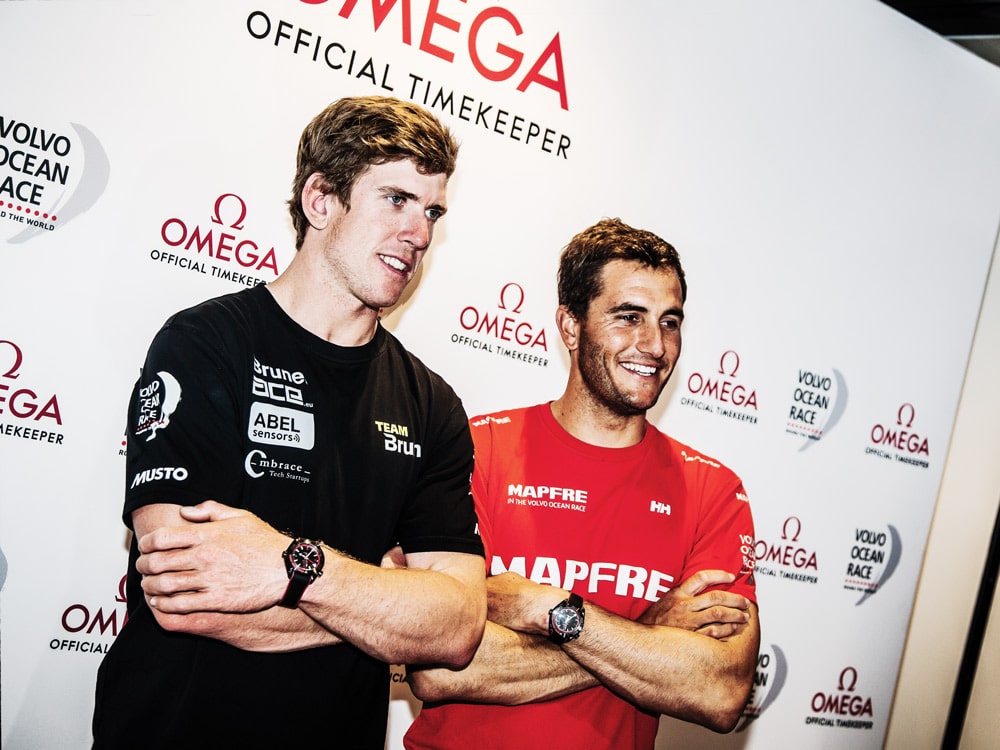
Newport stopover. Official unveiling of the OMEGA Volvo Ocean Race winner’s watch. 17 May, 2018.
The Tuke boys grew up in paradise, at the end of the Kerikeri Inlet in the postcard-perfect Bay of Islands. “We had special times. After school we’d build huts in the bush or go down to the water and cruise around on our boogie boards and kayaks. Our imaginations ran wild,” Jesse says.
Their father, Andy, imported fishing gear. Their mom, Karin, ran the local bookshop and post office in town. They bought a cruising yacht, a Warwick 56, when Blair was 8.
But it wasn’t till age 11 that Tuke learned to sail. It began with a school sailing day run by local teacher Derry Godbert. A Kiwi coaching legend, he’s now well into his 80s and still teaching kids to sail.
After Tuke “kind of liked” the sailing day, his parents bought an old P-class dinghy for $200. They kept it on the lawn at home and mucked around in it in summer.
“Although I didn’t sail until later than most kids, a big thing going for me was growing up around the water. I understood the tide and the wind,” Tuke says. “I wouldn’t say I was a fully natural sailor. I had to work pretty hard at it.”
Tuke bypassed the P-class route most Kiwi kids follow and learned team racing. Among the fleet of Kerikeri kids were Brad Farrand, who sailed the Volvo Ocean Race with Dutch entry AkzoNobel, and Andy Maloney, who pedaled next to Tuke on Team New Zealand’s AC50 in Bermuda. “We figured out then that the more hours we spent on the water, the faster we could make the boats go,” Tuke recalls. Homework wasn’t a priority.
Tuke also loved New Zealand’s national game, rugby, and played until he was 15. “Some of my best sporting competitions were playing rugby on cold Saturday mornings,” says the promising young halfback. “I still have a pretty big passion for it.”
He now sees he was unlikely to have ever made the All Blacks. But it was still a tough decision to quit the game, even when the alternative was a trip to Belgium to compete at the 2005 Splash World Championship. It was a wise choice. On his third attempt at the Splash worlds, in Riva del Garda, Italy, 17-year-old Tuke won his first world title.
By then, the Tuke family had moved to Auckland, living in the Viaduct on board a boat for a year. Tuke left school early to take up an electrical apprenticeship. “I didn’t want to go to university. I’d rather work and learn,” he says.
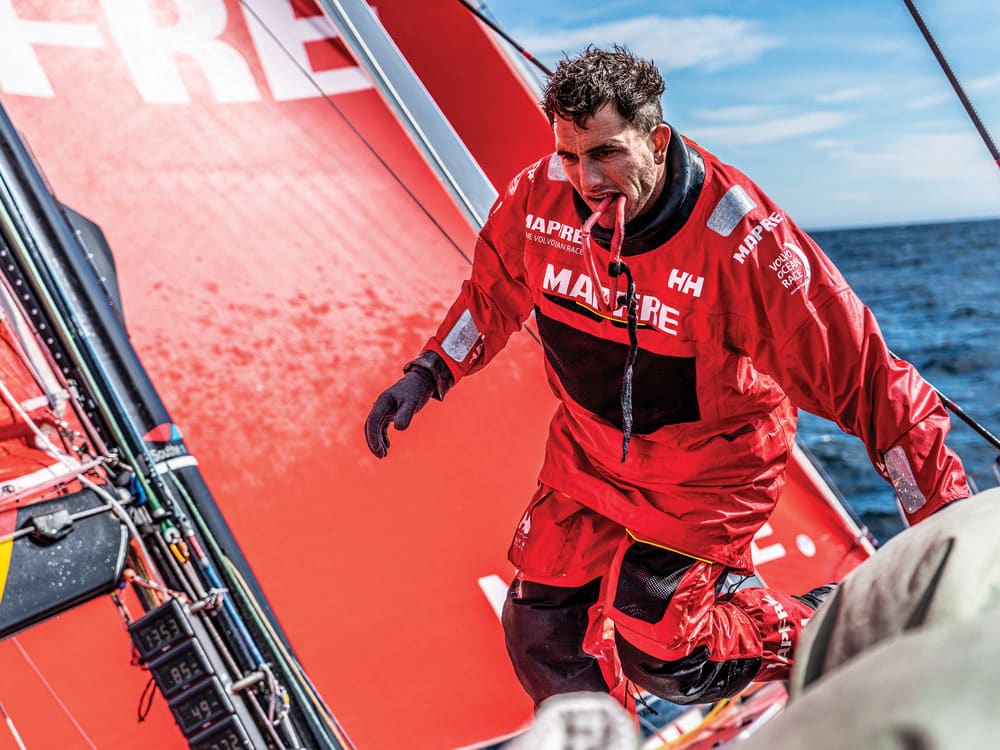
Leg 11, from Gothenburg to The Hague, day 03 on board MAPFRE, Blair Tuke. 23 June, 2018.
“I didn’t think sailing would be my life. I just wanted to be a better sailor, so I took every opportunity that came.” He went to two Youth Worlds in the 29er, then came under the tutelage of Olympic boardsailing gold medalist Bruce Kendall, in a Tornado campaign that didn’t qualify for the 2008 Beijing Olympics.
Nevertheless, Tuke learned “good life skills” from the avant-garde Kendall. “He reinforced the importance of always enjoying what you’re doing, and always being who you are,” Tuke says. “I think I’ve been pretty good at that.”
“I love the combination of tight racing, adventure and endurance.”
I t was around this time that Tuke first met Burling. They’d been New Zealand teammates at the Youth Olympic festival in Australia and spent a summer racing against each other in the International 420s. Burling and his crewmate Peter Evans won back-to-back world International 420 titles before racing the 470 at the 2008 Beijing Olympics.
Burling, then 17, sent Tuke an email. “He knew he and Carl would be too big for the 470 and wanted another challenge. So, we sat down with our parents and talked about an Olympic campaign. We bought a pretty crappy 49er for $5,000 and said, ‘Let’s try it out for a few months and see how it goes,’” Tuke recalls.
And so began one of the greatest partnerships in world sailing history.
Tuke was “super stoked” with their silver medal at the London Olympics. “It was where we were meant to be.” They’d climbed a steep learning curve, with the help of eventual gold medalists, Australians Nathan Outteridge and Iain Jensen. “But we ran out of time — something we rectified later,” says Tuke.
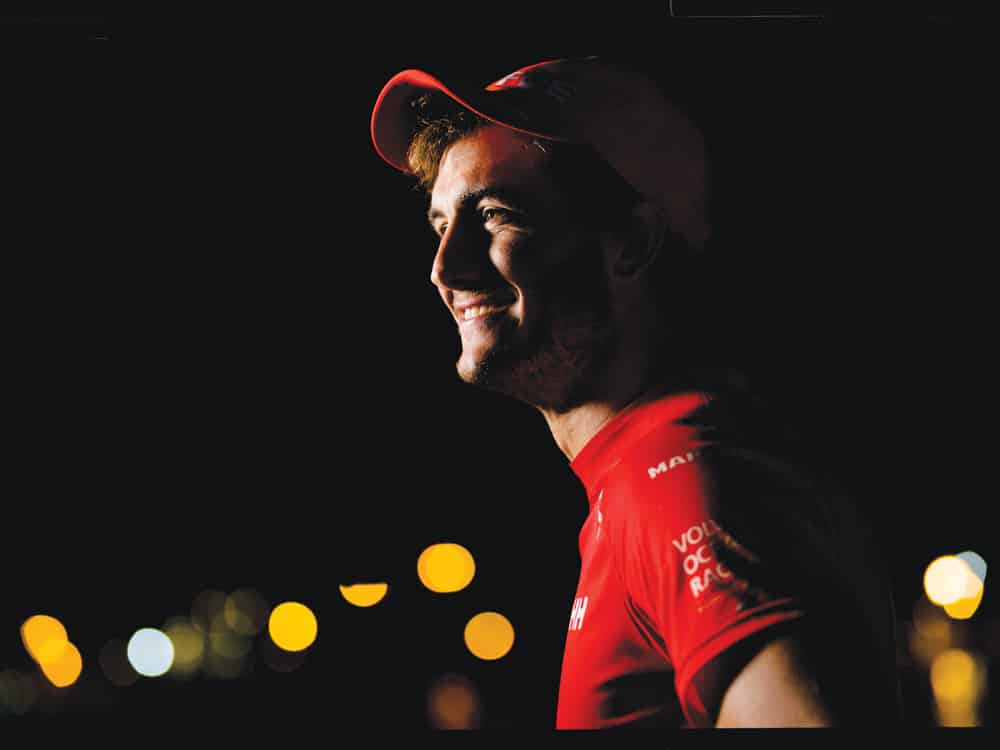
Prologue arrival in Alicante Stopover. Boats arriving. Photo by Pedro Martinez/Volvo Ocean Race. 12 October, 2017.
It was clear the two of them had a golden relationship. Willcox, their 49er coach, always saw it. “When you put two incredible sailors together and the chemistry works, then you’re getting 200 percent out of that performance. Pete and Blair are able to push the right buttons together and have a huge amount of respect and trust that makes it work.”
They are great mates, Tuke confirms. “It helps that from the start, it was always a two-way campaign with an equal say in everything — using our skill sets the best we can, knowing the other guy is doing all he can.”
Tuke’s strengths are tactics, making the boat go faster and attention to detail. Burling, the skipper, is stronger at rigging and tuning the boat.
In the four years leading up to the 2016 Rio Olympics, the Kiwis were unbeaten in an unprecedented 27 straight 49er regattas. Until the final practice event in Rio. They finished third, but Tuke sees it now as a godsend. They had the wrong mast and weren’t focused on racing.
Come the Rio Olympics, they never put a foot wrong. Tuke and Burling were honored as the New Zealand team captains, carrying the flag into the opening ceremony, and soon after, on Guanabara Bay, they clinched gold before the medal race. “The most pleasing thing was that we sailed one of our best regattas. Not many people can do that under the pressure of the Olympics,” Tuke says.
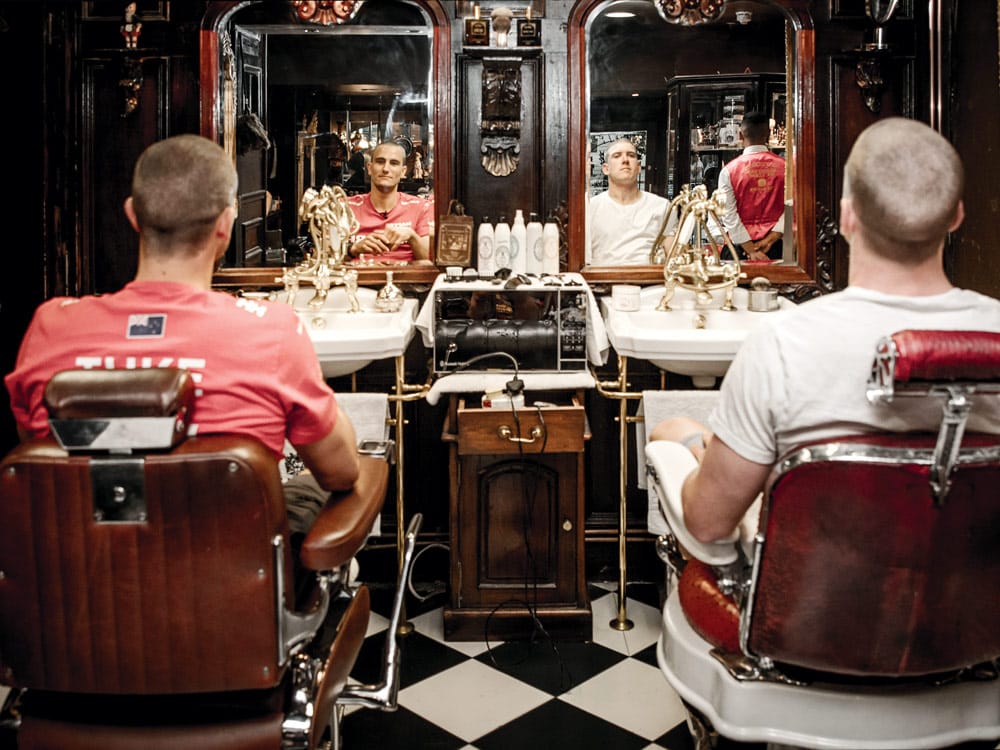
Cape Town Stopover. Peter Burling and Blair Tuke get their hair done at the barber. Photo by Ainhoa Sanchez/Volvo Ocean Race. 25 November, 2017
He would love to defend that Olympic title in Tokyo. “But we’ve got to be 100 percent sure we can do it properly, or we walk away knowing we’ve done a great job.”
The end of 2016 was one of the toughest times Tuke faced in his sailing career. “We’d come off a massive high and went straight into the America’s Cup trenches,” he remembers. “Finding our feet in the place was a bit of a challenge.”
That was until the beginning of 2017, when the AC50 Aotearoa New Zealand was launched, with its radical cyclor-power system, and the team all came together.
“People probably didn’t realize what my job was, even now. ‘Flight controller’ was what we called it,” Tuke says of his job pedaling and controlling the daggerboards. “With all the innovation and technology, I was learning right the way through.”
He enjoyed the fact he wasn’t “under the same scrutiny” as Burling, the helmsman and ultimately the spokesman of the team. “I found it a lot easier than I did at the Olympics, pressure-wise. In Bermuda, I didn’t have that much lumbered on me, so it was quite easy to go about my job,” he says.
It wasn’t until they reached Bermuda that Tuke knew they had a fast boat. He knew they could win the America’s Cup in their first loss to defenders Oracle in the round-robin series. “We just mucked up two simple things in that race. Other than that, the boat was going fast, and we were getting better sailing it.”
The day Tuke was catapulted into the sea when the boat pitch-poled, he’d never been more afraid.
“At first it was slow motion, then it all happened super quick. I was controlling the foils, looking at the leeward hull, and all I could think about was the board. But then I was in the water, and I didn’t know if I was coming up underneath the boat.”
When he popped up, he tapped his helmet, letting the chase-boat driver know he was OK. It took a while longer for him to be certain the boat would be OK too.
When Tuke first started sailing, he read Australian journalist Rob Mundle’s book Ocean Warriors, about the 2001-02 Volvo Ocean Race. “I read it and thought, This race is sweet. I want to do this,” he says. As a teen, he sailed with his father from Auckland to Fiji three times and loved it.
The invitation to sail in the VOR came straight from Mapfre skipper Xabi Fernández, who had sailed against Tuke in the 49ers.
“I love the combination of tight racing, adventure and endurance,” he says. “There’s not a lot of time to think about things at home, or big philosophical life issues. You sail the boat, try to make it go fast, then sleep and eat. You learn how to keep pushing when you’re tired. You’re always conscious of how you act and how that relates to others. I’ve learned so much about how to get the best out of others.”
Tuke’s watch captain Pablo Arrarte says the Kiwi is a good man to have on board, not just for his sailing skills. “When he’s happy on the boat, he’s a good singer,” Arrarte says. And then Tuke breaks into song: “I’m coming home, I’m coming home. I’ve sailed the world, I’m coming home.”
On that note, Tuke says, it’s time he tried to regain some equilibrium in his life. There hasn’t been time lately for him to settle down in a home or have a girlfriend.
“I think I’ll sail for a big chunk of my life, but obviously, there are other things I want to do. It’s been hard to have a balance,” he says. “So now I have to try and bring that back a little bit.”

